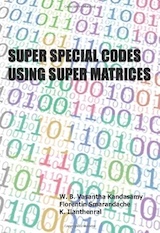
|
FreeComputerBooks.com
Links to Free Computer, Mathematics, Technical Books all over the World
|
|
- Title: Super Special Codes Using Super Matrices
- Author(s) W.B.Vasantha Kandasamy, Florentin Smarandache, K.Ilanthenral
- Publisher: Svenska fysikarkivet (August 3, 2010); eBook (Creative Commons Licensed)
- License(s): Creative Commons License (CC)
- Hardcover: 161 pages
- eBook: PDF
- Language: English
- ISBN-10: 9185917133
- ISBN-13: 978-9185917136
- Share This:

|
Super special codes are constructed for the first time using super-matrices. Several interesting properties of these codes, along with their applications to other fields are discussed in this book.
About the Authors- N/A
- Linear Algebra and Matrix Algebra
- Popular, Recreational, and Miscellaneous Mathematics
- Numerical Analysis and Scientific Computing
- Mathematical and Computational Software
 Similar Books:
Similar Books:
-
 Linear Algebra: Theory, Intuition, Code (Mike X Cohen)
Linear Algebra: Theory, Intuition, Code (Mike X Cohen)
Are you ready to dive into the vibrant world of linear algebra and see how it powers real-world applications? Welcome to this comprehensive guide, where traditional theory meets modern computational practices.
-
 Linear Algebra with Python (Sean Fitzpatrick)
Linear Algebra with Python (Sean Fitzpatrick)
This textbook is for those who want to learn linear algebra from the basics. Python is used throughout the book to explain linear algebra. Learning with Python interactively, readers will naturally become accustomed to Python coding.
-
 Linear Algebra Done Right (Sheldon Axler)
Linear Algebra Done Right (Sheldon Axler)
The text focuses on the central goal of linear algebra: understanding the structure of linear operators on finite-dimensional vector spaces. The author has taken unusual care to motivate concepts and simplify proofs.
-
 Programming for Computations - Python 3 Edition
Programming for Computations - Python 3 Edition
This book outlines the shortest possible path from no previous experience with programming to a set of skills that allows students to write simple programs for solving common mathematical problems with numerical methods in the context.
-
 Introduction to Scientific Programming with Python
Introduction to Scientific Programming with Python
This book offers an initial introduction to programming for scientific and computational applications using the Python programming language. The presentation style is compact and example-based, assuming little or no prior experience in programming.
-
 Scipy Lecture Notes (Emmanuelle Gouillart, et al)
Scipy Lecture Notes (Emmanuelle Gouillart, et al)
This book teaches the scientific Python ecosystem, a quick introduction to central tools and techniques. It is for programmers from beginner to expert. Work on real-world problems with SciPy, NumPy, Pandas, scikit-image, and other Python libraries.
-
 Computational Physics with Python (Eric Ayars)
Computational Physics with Python (Eric Ayars)
This book provides an unusually broad survey of the topics of modern computational physics. Its philosophy is rooted in learning by doing, with new scientific materials as well as with the Python programming language.
-
 From Python to NumPy (Nicolas P. Rougier)
From Python to NumPy (Nicolas P. Rougier)
NumPy is one of the most important scientific computing libraries available for Python. This book teaches you how to achieve expert level competency to perform complex operations, with in-depth coverage of advanced concepts.
-
 Solving PDEs in Python: The FEniCS Tutorial I (H. Langtangen)
Solving PDEs in Python: The FEniCS Tutorial I (H. Langtangen)
This book offers a concise and gentle introduction to finite element programming in Python based on the popular FEniCS software library. Using a series of examples, it guides readers through the essential steps to quickly solving a PDE in FEniCS.
-
 Python Scripting for Computational Science (Hans Langtangen)
Python Scripting for Computational Science (Hans Langtangen)
With a primary focus on examples and applications of relevance to computational scientists, this brilliantly useful book shows computational scientists how to use small scripts written in the easy-to-learn, high-level Python language.





